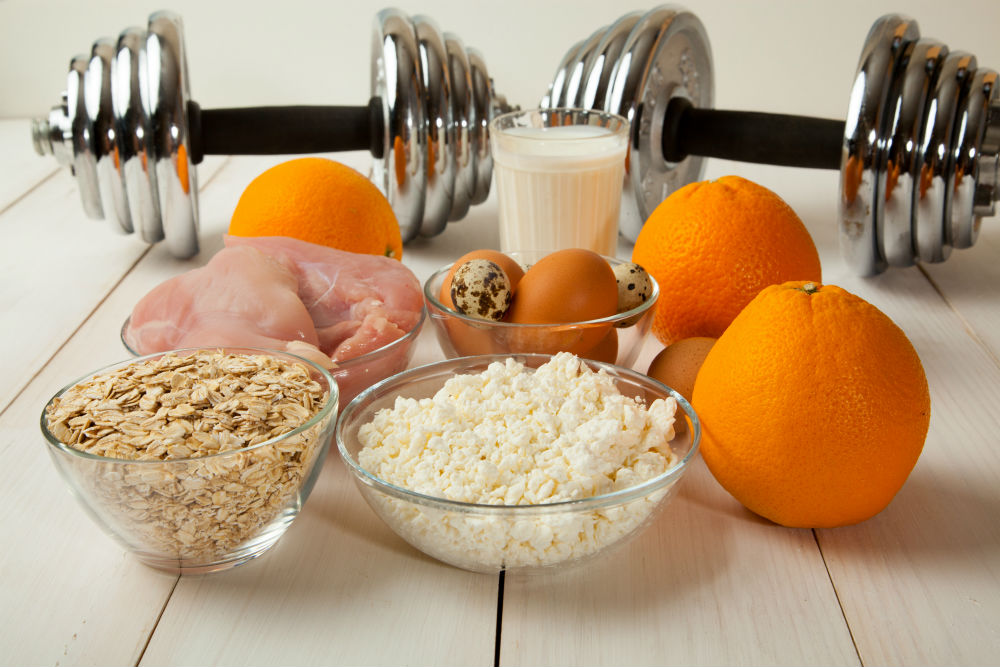
In another blog post, we looked at what to eat before and after exercise. That article explained the special role that proteins play – which is why we want to delve deeper and take another look at proteins in more detail. Eating protein after exercise can help you reach your goals faster. Why is that the case? pjuractive reveals all.
Why proteins are so important after exercise
Proteins are an essential part of any diet. They can build new cells and repair existing cells. They are also the building blocks for all cells in the human body, and because our bodies can’t store them we need a constant supply. We can get protein from a variety of foods. It can be found in animal products such as meat, fish, and dairy products, but it can also be found in plant-based products such as legumes or soya products. These sources of protein should form part of our everyday nutrition and should take on special importance in connection with sport, in particular.
Consuming additional protein following exercise can not only help you lose weight. It also assists with muscle growth and provides the endurance you need. Protein is extremely important for weight loss because a high level of protein in your diet helps you build muscle, which in turn increases your calorie consumption. If you have more muscles, you therefore burn more calories, helping you reach a calorie deficit more quickly. This also demonstrates why proteins are so important for muscle-building. Proteins are the building blocks of muscles. It doesn’t matter how much strength training you do – if you don’t get enough protein, your muscles can’t grow. Yet just as with strength training, we also need protein for endurance training. If we don’t get an adequate supply, during physical exercise our body will take what it needs from the proteins produced naturally in the body, and that can have a negative impact on our condition, our endurance, and our performance.
So no matter what your goal, proteins are vital. But how much protein do you need to eat, what forms of protein are best, and when is it most beneficial to eat protein?

How much protein should you eat after exercise?
The British Nutrition Foundation recommends that adults aged 19 and over consume 0.75 grams of protein per kilogram of body weight per day. However, this is the figure for people who do not do any exercise. Athletes should make sure that their protein intake is between 1.2 and 1.5 grams per kilogram of body weight. It is particularly important to make sure you eat protein after exercise, as this helps your body regenerate. If you’ve just done a cardio training session, you’ll need a meal that consists of carbohydrates and proteins in a ratio of 3:1.The ideal amount of protein after strength training would be 15 to 20 grams. This should be eaten as part of a meal following your training session. However, the motto ‘a little is good, a lot is better’ doesn’t apply here, because our body cannot metabolize more than 20 grams of protein at once. So pay attention to how much protein you eat following a training session!
What form should the protein take that you consume after exercise?
Some people will prepare a protein-rich meal for themselves, while others swear by protein shakes or special protein bars to give them the protein they need after a training session. In principle, it is possible to get all the nutrients you need – including sufficient protein – with a balanced diet. Yet many athletes find they simply don’t have the time to prepare protein-rich meals, especially during the week. They will therefore have a protein shake instead or rely on a protein bar. Of course, the advantage of protein shakes or bars is that you know exactly how much protein you are having. You can also integrate them into your daily life without a lot of effort.

Protein before or after sport?
Some people try to have as much protein as possible before training, while others like to supply their muscles with protein immediately after their workout. Yet others wait a certain amount of time before they drink their protein shake, eat their protein bar, or even eat the protein-rich meal they have prepared. One American study looked at the benefits of consuming protein and the time of consumption. Some participants had the protein before exercising, while a second group of participants did not have the protein until after completing their workout. The results showed that the protein was stored more quickly in the muscles after training, and was therefore better able to help with muscle regeneration. This corresponds with advice from specialists in sports medicine, who advise having protein 30 minutes after exercise. Besides, eating protein before a workout can lead to stomach complaints or a bloated feeling.
We would therefore recommend that you incorporate protein into your diet, spread out throughout the day, and make sure you have the right amount of protein after workout. The amount of protein you need after exercise should always correspond to your training goal. If you are mindful of that, you will probably find you reach your training goal faster – try it for yourself!